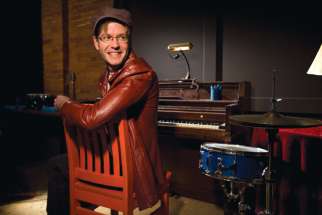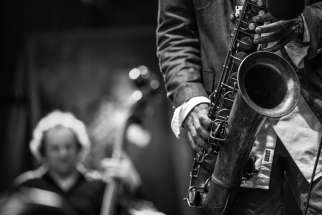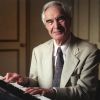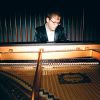Sacred music and jazz, one composer's response to Vatican II
ROME, Italy – For American composer J.J. Wright, the Second Vatican Council's call to inculturate the Church's ancient musical traditions into “mission territory” – while preserving its unity – is something he has adopted personally with one of his greatest passions: jazz.
Catholic jazz pianist Dave Brubeck dies
WASHINIGTON - Dave Brubeck, the influential and prolific pianist whose composition "Take Five" became a standard in the annals of jazz, died Dec. 5 at age 91, one day before his 92nd birthday.
David Braid, a faithful performer
TORONTO - Pianist David Braid originally got into jazz after developing a deep affinity for one of history’s greatest composers — Mozart. Indeed, it was once said of Braid, by the Halifax Chronicle-Herald, “If Mozart played jazz, he’d be David Braid.”
Currently en route to Beijing to perform two concerts, Braid’s resumé boasts two Juno Award wins, Jazz Pianist of the Year in Canada and a SOCAN Composer of the Year award. He has composed more than 80 works for piano, ensembles and orchestras, and has released nine recordings. However, despite his lauded career and whirlwind of performance engagements, Braid cites a much more reflective inspiration for some of his work — one that comes from a Sunday evening student Mass at the St. Thomas Aquinas Chapel at the Newman Centre at the University of Toronto.
“The students seemed particularly still in a moment of silent prayer while a particularly beautiful but irregular hymn with an atypical harmonic movement and meter was being performed. The feeling of that particular harmony, rhythm and meter at that particular moment impressed upon me a buoyancy and uplifting feeling which I liked very much,” said Braid.
“I wanted to capture that and recreate that feeling in a piece of my own to share with my audiences. Fifteen years later, my composition ‘Say a Silent Prayer’ is one of my most performed and popular pieces.”
This inspiration, drawn deeply from a lifelong involvement in the Catholic Church, presents itself in Braid’s prolific body of work — not always in an obvious sense, but subtly colouring his uniquely melodic compositions.
“In a general way, when I think about the largest quantity of music I was exposed to throughout my childhood, it must have been church music at Sunday Mass because music was not a big part of my culture at home outside of my piano studies,” said Braid. “In my opinion, the large body of hymns in The Catholic Book of Worship, which I hear every Sunday, never manifest in any of my writing, but I think there is a vocal or lyrical quality in my melodic writing which relates back to those songs.”
Born in Hamilton, Ont., Braid attended Regina Mundi Elementary School followed by St. Thomas More High School. After moving to Toronto, where he is a faculty member at the University of Toronto, Braid began attending St. Basil’s parish as well as St. Vincent de Paul, due to an increasing interest in the Tridentine Mass.
Despite his accomplishments in jazz, a field that boasts a select number of stars, Braid is quick to highlight the integral role that his faith has played in his overwhelming achievements.
“I can not honestly take any ownership of whatever success I might have had. This is because I feel I am just trying my best to live out a vocation with enough sincerity that I can continue to grow,” said Braid.
“On another level, I can say that experiencing the Catholic sacraments throughout the weeks and years of my life lead me to understand that my faith does not exist as ‘a role’ but rather intrinsically changes who or what I am fundamentally. In this way, I would say that at my best moments of creating music, I am certainly not the creator but a kind of instrument able to respond to a mysterious inspiration.”
Braid is certainly a prolific creator. He writes for solo piano, jazz ensembles, chamber ensembles and symphony orchestras — a well-rounded composition portfolio that certainly augments any pre-conceived notions of jazz composition.
“In my opinion, writing traditional jazz music is more like ‘song writing.’ A song becomes interesting when the performer is spontaneous with the melody, harmony and rhythm… good quality song writing, or good quality jazz writing inspires interesting improvisation,” said Braid.
“Contemporary jazz composition does essentially the same thing, however the composition’s elements such as melody, harmony, rhythm and form are typically more complex.”
Additionally, Braid has found some specific elements of his Catholic practice that work their way into his writing.
“Direct inspirations include my composition ‘El Castillo Interior,’ inspired by the book of the same title written by St. Teresa of Avila in 1577,” said Braid.
“Another popular piece of mine, ‘Reverence,’ was based on the first four chords of a folk hymn that I heard a lot growing up called ‘Though the Mountains May Fall.’ I am a bit ashamed to admit that I always felt a little embarrassed by a kind of sentimental feeling I felt from that song, but I later used the opening chords to launch a new piece of my own.”
Braid’s upcoming performances on Dec. 5 and 6 in Beijing, which he has been doing annually since 2006, will be a solo piano recital at the Forbidden City Concert Hall as well as a premiere of music he has written for string quartet and piano at the Beijing University Centennial Concert Hall with the Peking Sinfonietta String Quartet. Braid has also just released a double CD album of two live recordings for the CBC radio broadcast The Signal.
As a man with such a wealth of performance and musical moments under his belt, Braid finds it difficult to pinpoint one particular moment that he cherishes best.
“Without trying to be facetious, my favourite performance and moment is definitely the next one. I feel that my work is always on an incline where I am always looking up ahead at where I am going. Whenever I feel like I am looking behind at what I was involved with before, I have stopped growing.”
TORONTO - The funky former professional jazz musician Fr. Stan Fortuna from New York’s Community of Franciscan Friars of the Renewal will perform two shows in Toronto this month.
Fortuna and his Fodera five-string bass will first appear on May 18 at the Poetry Jazz Cafe in Kensington Market.
“I’m going to be playing with a young Catholic-Italian pianist, Carmen Spada, and a drummer,” said Fortuna, ordained in 1990. “It’s going to be great, we’re just going to improvise and play some jazz standards and I’ll do some of my stuff too.”






